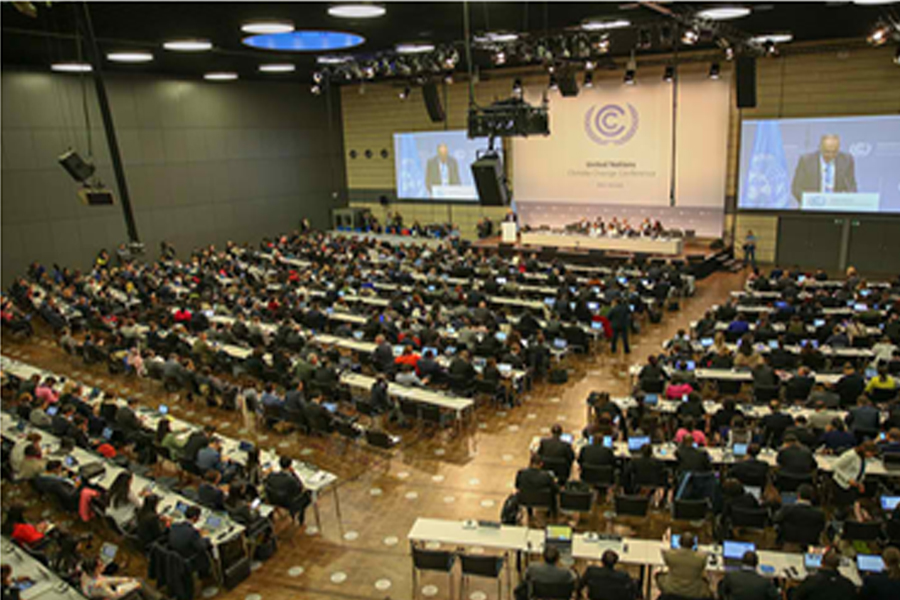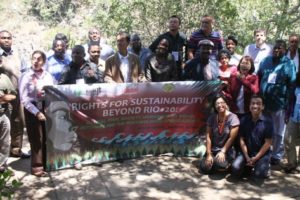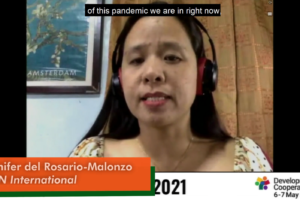[[{“type”:”media”,”view_mode”:”media_large”,”fid”:”1480″,”attributes”:{“alt”:””,”class”:”media-image”,”height”:”320″,”style”:”width: 350px; height: 233px; margin: 5px; float: right;”,”typeof”:”foaf:Image”,”width”:”480″}}]]
The Bonn Climate Change Conference of the United Nations Framework Convention on Climate Change (UNFCCC) convened from May 16 to 26, 2016 in Bonn, Germany to discuss the operationalization of the Paris Agreement which was adopted by 194 Parties in December 2015 and endorsed by 177 countries in April 2016. The Conference is expected to have laid the foundation for the success of the COP 22 in Marrakech, Morocco in November; however, it is still a long way from achieving the vision of balance, equity, and ambition to genuinely solve the planetary crisis.
The two week conference includes the meetings of the Subsidiary Body for Implementation (SBI 44), the Subsidiary Body for Scientific and Technological Advice (SBSTA 44), and the new Ad Hoc Working Group on the Paris Agreement (APA). These technical bodies are tasked to work on developing the rules, tools, and mechanisms to account financial resources and overall reporting and transparency arrangements. Their work also includes improving the delivery of capacity building and technology cooperation and to develop a loss and damage regime. The conference also featured several sessions discussing the mechanisms that will ensure adequate support for the implementation of Nationally Determined Contributions (NDCs) and how these can be integrated in national economic plans.
The first four days of the conference was spent by the APA trying to negotiate its agenda for “unpacking” the Paris Agreement – which will be implemented post-2020- by identifying the gaps, synergies and overlaps among the mandates of the different subsidiary bodies and resulted in the stalling of the negotiations with talks on technicalities, procedures, and metrics as to how to go about with the negotiations instead of focusing on the more important issue of mobilizing concrete commitments for the pre-2020 ambition to address climate change.
The Paris Agreement provides the global framework to address climate change in the period after 2020 by setting the goals to keep the global average temperature rise to below 2°C above pre-industrial levels and ensuring efforts to limit the temperature increase to 1.5°C.
Developing countries remain firm in their position on the issues of climate finance, and adaptation and loss and damage, reiterating that developed countries have the historical responsibility and legal obligations to provide finance and technology resources for poor and developing countries.
Major contentions over the provisions of the Paris agreement remain:
- Diminished historical responsibility and legally binding commitments from developed countries. The 5-yearly ambition mechanism which requires Parties to update their Nationally Determined Contributions (NDCs) is insufficient and not mandatory.
- Lack of commitments to limit temperature rise to below 1.5 degrees Celsius. With current commitments on emissions reductions the world is still on track for a 3 degrees Celsius of warming.
- Inadequate climate finance. The existing goal to which requires developed countries to raise USD100 billion per year by 2020 to assist developing countries in their adaptation and mitigation efforts remains a pledging system. There is also no new funding commitments after this period.
- No mechanism for most vulnerable countries to demand liability and compensation for loss and damage.
- The Paris agreement remains highly influenced by transnational corporations (TNCs) and international financial institutions that were able to push for business-as-usual and profit oriented false solutions such as carbon markets, geo-engineering and carbon-offset mechanisms.
The hyped Paris Agreement with its astonishing numbers of country adoptions and commitments brings the illusion that meaningful action and solutions are made after 21 years of climate negotiations. However, there is still so much to be done on the road to COP22, which is hoped to be the “action COP” that will ensure the entry into force of the Agreement. Concrete efforts and commitments are still needed to bridge the gap between ambition and actual emission reductions pledges by the Parties.
Upcoming developments that civil society should watch out for:
- The ratification of the agreement by 55 country ratifications accounting for at least 55% of global GHG emissions.
- Development of long-term low-carbon strategies and revision of NDCs, and implementation of NDCs by the Parties.
After 21 years of failed negotiations, the challenge ahead is to expose the root causes of the climate crisis, the inadequacy of the climate change negotiations, and to strengthen grassroots movements, indigenous communities, and frontline communities in the struggle for climate justice and genuine social change.
*IBON CJ Watch offers timely updates on various climate-related issues and activities that must be followed for more informed climate justice advocacy and engagement.




